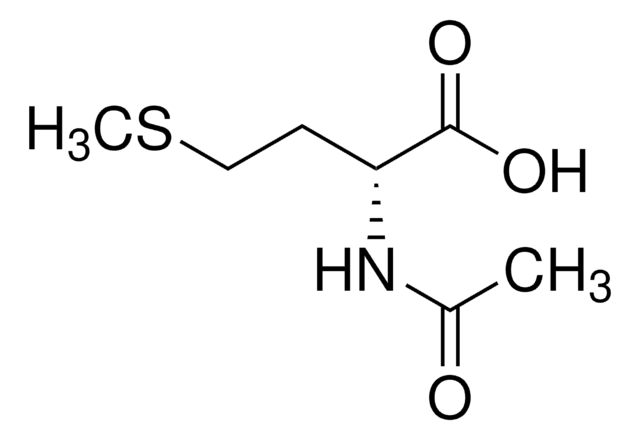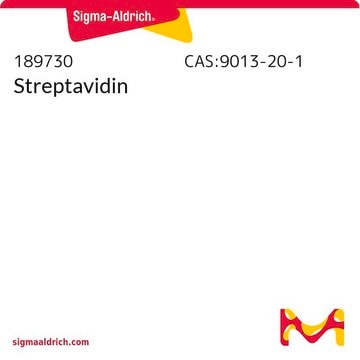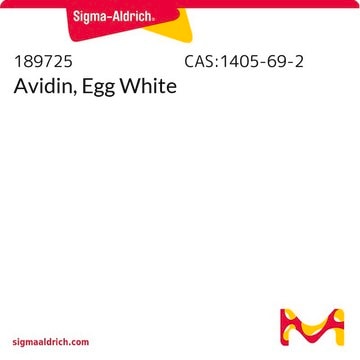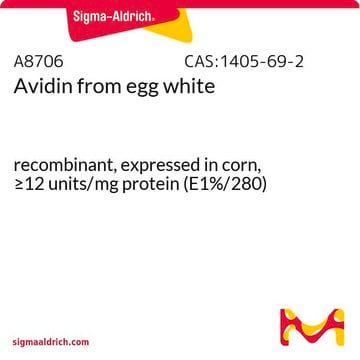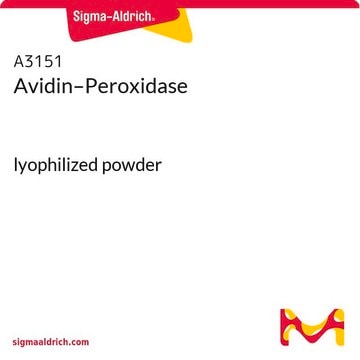A9275
Avidin from egg white
BioUltra, lyophilized powder, ≥10 units/mg protein (E1%/280), ≥98% (SDS-PAGE)
Sign Into View Organizational & Contract Pricing
All Photos(1)
About This Item
Recommended Products
biological source
egg white
product line
BioUltra
Assay
≥98% (SDS-PAGE)
form
lyophilized powder
specific activity
≥10 units/mg protein (E1%/280)
mol wt
glycoprotein 66 kDa
subunit 16 kDa
storage temp.
2-8°C
Looking for similar products? Visit Product Comparison Guide
Related Categories
General description
Avidin protein is a homotetrameric protein (68kDa) that is obtained from egg whites. This egg protein binds strongly to biotin. Thus, avidin-biotin association has been utilized in immunoassays to detect the localization of antigens in tissues. The use of avidin-biotin immunoassay enhances the sensitivity of the technique and facilitates the detection of antigens in low quantities.
Application
Avidin egg white was used in an assay using functionalized xenon as a biosensor to detect biotin-avidin binding. Egg white was used at 80 nmol.
Egg white avidin has been used as a cross-linker for biotin-conjugated antibodies. The product has also been used as a blocking agent in ELISA applications.
Unit Definition
One unit will bind 1.0 μg of d-biotin.
Preparation Note
Affinity purified
Disclaimer
Unless otherwise stated in our catalog or other company documentation accompanying the product(s), our products are intended for research use only and are not to be used for any other purpose, which includes but is not limited to, unauthorized commercial uses, in vitro diagnostic uses, ex vivo or in vivo therapeutic uses or any type of consumption or application to humans or animals.
Storage Class Code
11 - Combustible Solids
WGK
WGK 3
Flash Point(F)
Not applicable
Flash Point(C)
Not applicable
Personal Protective Equipment
dust mask type N95 (US), Eyeshields, Gloves
Certificates of Analysis (COA)
Search for Certificates of Analysis (COA) by entering the products Lot/Batch Number. Lot and Batch Numbers can be found on a product’s label following the words ‘Lot’ or ‘Batch’.
Already Own This Product?
Find documentation for the products that you have recently purchased in the Document Library.
Customers Also Viewed
Q Wang et al.
The American journal of physiology, 275(5 Pt 2), R1584-R1592 (1998-10-29)
We examined the effect of endotoxemia in mice on protein and mRNA levels for the acute phase proteins complement C3 and serum amyloid A (SAA) in jejunal mucosa. Endotoxemia was induced in mice by the subcutaneous injection of 250 microg
Lee B Sims et al.
Investigative ophthalmology & visual science, 60(5), 1696-1705 (2019-04-23)
The goal of this work was to design and assess the ability of unmodified and surface-modified poly(lactic-co-glycolic acid) (PLGA) nanoparticles (NPs) to enhance cell association, provide efficacy in retinoblastoma cells, and overcome current administration challenges, including hydrolysis and precipitation, of
Hiresh Ayoubian et al.
The Journal of general virology, 98(8), 2128-2142 (2017-08-02)
The Epstein-Barr virus is a human herpes virus with oncogenic potential. The virus-encoded nuclear antigen 2 (EBNA2) is a key mediator of viral tumorigenesis. EBNA2 features an arginine-glycine (RG) repeat at amino acids (aa)339-354 that is essential for the transformation
Jana Svobodová et al.
PeerJ, 9, e12401-e12401 (2021-11-27)
Microbiome formation and assemblage are essential processes influencing proper embryonal and early-life development in neonates. In birds, transmission of microbes from the outer environment into the egg's interior has been found to shape embryo viability and hatchling phenotype. However, microbial
Lianxiang Bi (毕联祥) et al.
Arteriosclerosis, thrombosis, and vascular biology, 41(3), 1149-1155 (2020-12-11)
Efficient gene transfer to the vascular wall via intravenous vector injection would be useful for experimental vascular biology and gene therapy. Initial studies of lentiviral vector tropism suggested that intravenously injected vectors do not transduce murine vascular tissue; however, there
Our team of scientists has experience in all areas of research including Life Science, Material Science, Chemical Synthesis, Chromatography, Analytical and many others.
Contact Technical Service
